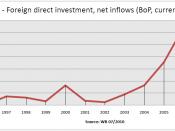"Technological changes, particularly in the space-shrinking technologies of transport and communication, help to make possible the internationalization of economic activity and the development and geographical spread of transnational corporations" (Dicken, 1992, p.120). These changes have made a great explosion in Foreign Direct Investment (FDI) in the last 20 years throughout the world. FDI has been growing at a high rate, and trade barriers have fallen extensively at the same time (De Santis and Stahler, 2003; Javalgi, Griffith, and White, 2003).
FDI itself is a form of investment that is best suited to provide risk sharing in a world economy where financial contracts are plagued by imperfect enforcement mechanisms (Albuquerque, 2003). There are numerous factors that can influence a firm's decision to undertake FDI. Some FDI may be undertaken to reduce the firm's costs; some of the decision to engage in FDI may be affected by such demand factors as developing access to new customers, exploiting competitive advantages, etc.
In addition, political considerations and environmental issues may also play a role in FDI (Mahoney, Trigg, Griffin, and Pustay, 2001). In short, the fundamental purpose of any business firm to engage in FDI, of course, is to make a profit (Hill, 2000).
One of the examples of FDI is the foreign investment made by Citigroup Inc to buy South Korea's KorAm Bank for US$ 2.7 billions. Under the cautious agreement, the world's largest lender will pay about 3 trillion won or about 16,000 won per share, for KorAm's stock (Jae-kyoung, 17 February 2004; Agence France Presse English, 23 February 2004). The question is, why a company like Citigroup Inc does not bulk up on consumer bank acquisitions in its domestic market as what their rivals (such as: Bank of America and J.P. Morgan) has done? Furthermore, Reuters reported that Citigroup Inc is...

